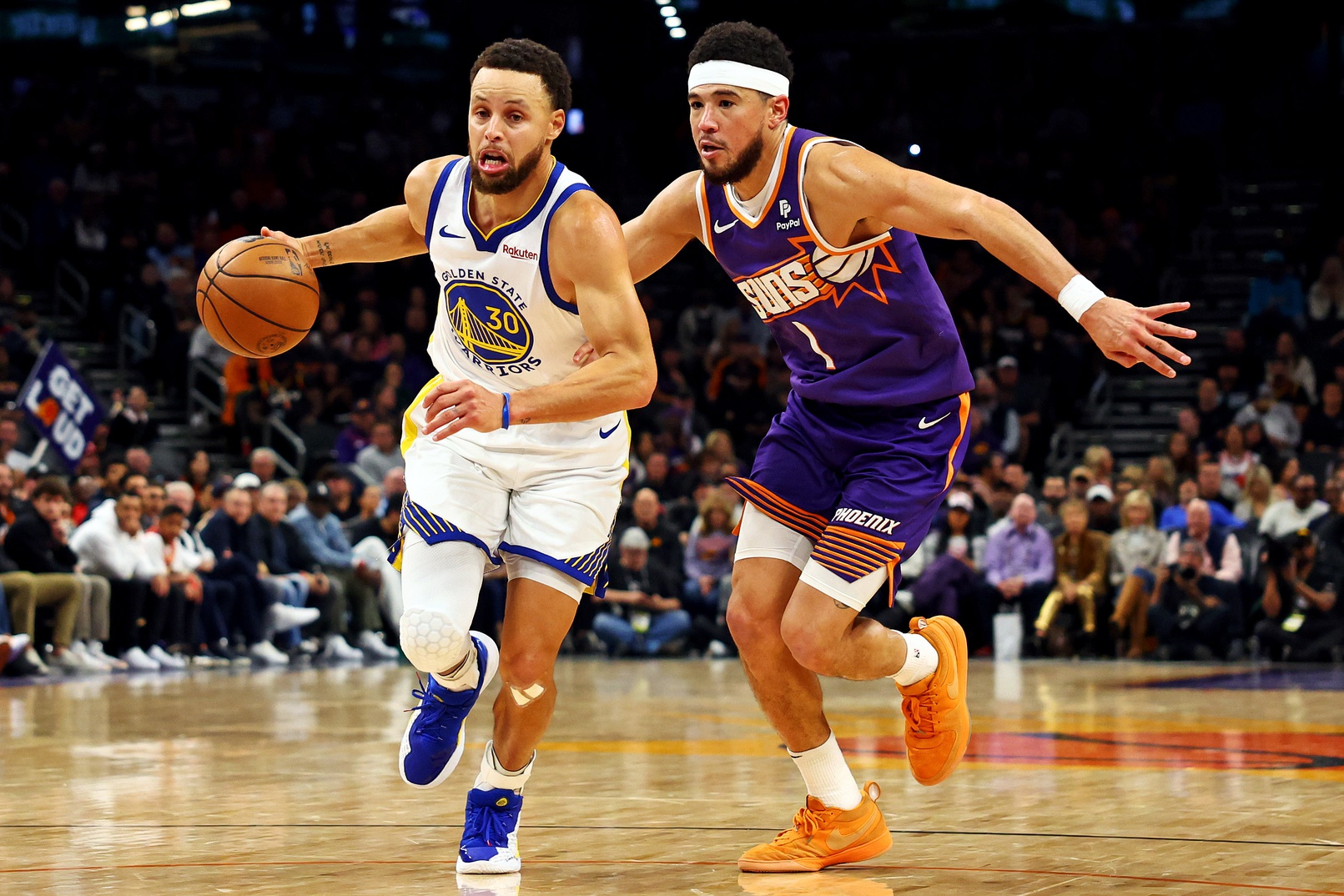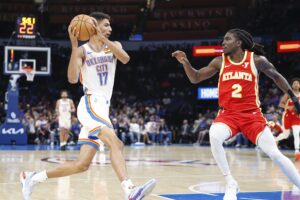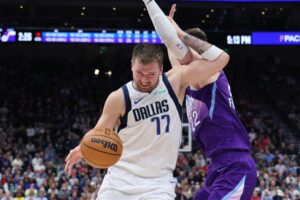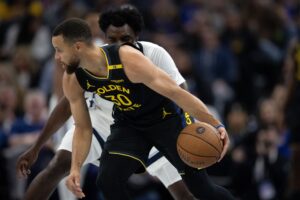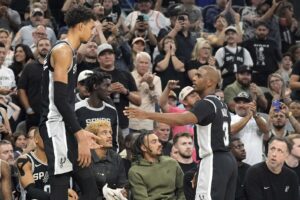Two weeks ago, the Atlanta Hawks won the draft lottery earning the first pick in the 2024 NBA Draft. It was a surprising outcome as they only had a 3% chance of doing so. With the draft about a month away, let’s take a look at each team’s best pick in the NBA Draft since 2000.
The best draft pick doesn’t necessarily mean the best player selected, but where they got drafted also was taken into consideration. Only time with the team that selected them is considered. For example, Luka Doncic was technically drafted by the Atlanta Hawks in the 2018 NBA Draft but never played for them. After doing the Eastern Conference teams yesterday, let’s now look at the Western Conference.
Best NBA Draft Pick By Western Conference Teams Since 2000
Dallas Mavericks – Josh Howard (29th overall, 2003)
Josh Howard averaged at least 18 points a contest for three straight seasons from 2006-07 to 2008-09. In the first of those seasons, the 6-7” forward was named an All-Star.
Jalen Brunson (33rd overall in 2018) will likely end up having a better career but played just four seasons with Dallas (compared to seven for Howard).
Denver Nuggets – Nikola Jokic (41st overall, 2014)
Who else could it be besides Nikola Jokic, a three-time MVP by the age of 29? The 6-11” center was named 2023 Finals MVP and has already recorded 130 regular season triple-doubles.
Golden State Warriors – Stephen Curry (7th overall, 2009)
What a career it has been for Stephen Curry, who is now 15 years deep into his NBA career. He has won four championships with the Warriors, been named an All-Star 10 times, and has connected on the most three-pointers in league history (3,747).
Houston Rockets – Yao Ming (1st overall, 2002)
Yes, injuries took away much time from Yao Ming being able to take the floor for the Rockets. In his eight seasons though, he made five All-NBA teams while averaging 19.0 points, 9.2 rebounds, and 1.9 blocks.
Clint Capela (25th overall in 2014) was almost the choice here instead.
Los Angeles Clippers – De’Andre Jordan (35th overall, 2008)
A constant lob threat, De’Andre Jordan led the league in field goal percentage for five straight seasons from 2012-13 to 2016-17. He also led the league in rebounding twice and finished top-four in Defensive Player of the Year voting three times.
Jordan is an example of not always choosing the best player drafted. Blake Griffin (1st overall in 2009) was the better player but selected 34 spots earlier in his draft.
Los Angeles Lakers – Andrew Bynum (10th overall, 2005)
While Andrew Bynum’s peak didn’t last very long, there was a time when he was one of the league’s top centers. He was a starter for two championship Lakers teams and was on the All-NBA Second Team in 2011-12.
Memphis Grizzlies – Ja Morant (2nd overall, 2019)
While off-the-court troubles have followed Ja Morant, he has played the role of transcendent point guard when playing. He won Rookie of the Year in 2019-20 and Most Improved Player in 2021-22.
Mike Conley (4th overall in 2007) deserves a mention as well playing 12 seasons with the Grizzlies.
Minnesota Timberwolves – Karl-Anthony Towns (1st overall, 2015)
Through his first nine seasons, Karl-Anthony Towns has made four All-Stars and two All-NBA teams on top of winning the 2015-16 Rookie of the Year. The seven-footer is also one of the best big-man shooters the game has ever seen.
There’s a good chance that Anthony Edwards (1st overall in 2020) will surpass Towns at some point if he hasn’t already.
New Orleans Pelicans – Chris Paul (4th overall, 2005)
Spending his first six seasons with New Orleans, Chris Paul was the runner-up for MVP in 2007-08. He led the league in assists twice and steals three times while with the franchise.
It’s a toss-up between Paul and Anthony Davis (1st overall in 2012) with Paul getting the slight edge due to being selected later.
Oklahoma City Thunder – Kevin Durant (2nd overall, 2007)
Playing his first nine seasons with the Thunder, Kevin Durant won four scoring titles with the team. He averaged 27.4 points while donning an Oklahoma City jersey and won the 2013-14 MVP.
Close behind is another former MVP Russell Westbrook (4th overall in 2008).
Phoenix Suns – Devin Booker (13th overall, 2015)
Devin Booker has been an incredible scorer for the Suns averaging at least 24.9 points each of the last seven seasons. The four-time All-Star was the top player on Phoenix’s run to the 2021 NBA Finals.
Don’t forget the impact that Amar’e Stoudemire (9th overall in 2002) made for the Suns throughout the 2000s.
Portland Trail Blazers – Damian Lillard (6th overall, 2012)
Named Rookie of the Year for 2012-13, Damian Lillard played 11 seasons with Portland. He was named to seven All-NBA teams and became the franchise’s all-time leading scorer (19,376 points).
Sacramento Kings – DeMarcus Cousins (5th overall, 2010)
Known by most as ‘Boogie’, DeMarcus Cousins made three All-Star teams with Sacramento. He averaged at least 22.7 points and 11.5 rebounds for three straight seasons from 2013-14 to 2015-16.
De’Aaron Fox (5th overall in 2017) also has a strong case and is still active with the team.
San Antonio Spurs – Tony Parker (29th overall, 2001)
A first-ballot Hall of Famer in 2023, Tony Parker played 17 seasons with San Antonio. He won four titles with the team (2007 Finals MVP) while being named an All-Star six times and an All-NBA member four times.
Utah Jazz – Paul Millsap (47th overall, 2006)
Beginning as a key reserve behind Carlos Boozer, Paul Millsap proved to be a hard-nosed player in his seven seasons with Utah. Utilized as a starter his last three seasons with the Jazz, he posted averages in that time of 16.1 points, 7.8 rebounds, and 1.5 steals.
While selected much higher, both Deron Williams (3rd overall in 2005) and Gordon Hayward (9th overall in 2010) received strong consideration.


